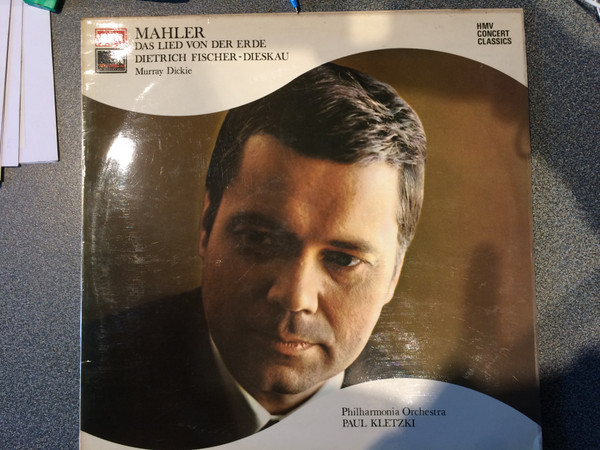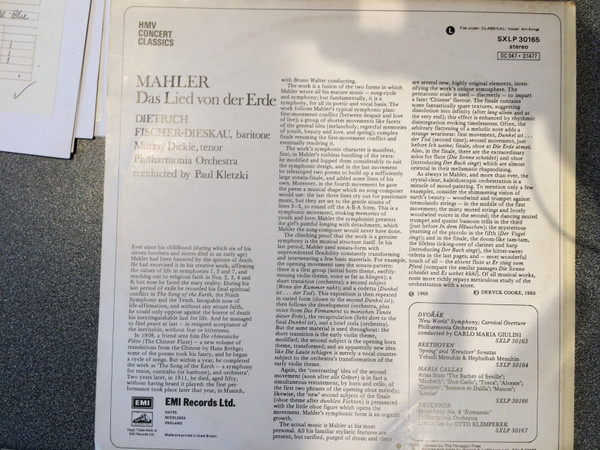MusiQ
Gustav Mahler, Dietrich FischerDieskau, Murray Dickie, Philharmonia Orchestra, Paul Kletzki - Das Lied Von Der Erde
Album: Das Lied Von Der Erde
Table of Contents
Download
Filename: gustav-mahler-dietrich-fischerdieskau-murray-dickie.rar- MP3 size: 24.6 mb
- FLAC size: 256.2 mb
Tracks
| Track | Duration | Preview |
|---|---|---|
| Von Der Jugend | ||
| Der Abscheid | ||
| Von Der Schönheit | ||
| Das Trinklied Vom Jammer Der Erde | ||
| Der Trunkene Im Frühling | ||
| Der Einsame Im Herbst |
Images


Catalog Numbers
SXLP 30165Labels
HMV Concert ClassicsListen online
- lytte på nettet
- ascolta in linea
- ouvir online
- online anhören
- écouter en ligne
- online luisteren
- escuchar en línea
- kuunnella verkossa
- lyssna på nätet
Formats
- Vinyl
- LP
Credits
| Role | Credit |
|---|---|
| Liner Notes | Deryck Cooke |
Notes
Original issue 1960. Same recording as: E 91 049/50 S, WALP 553/554 S, E 91 049/50 S, S-60260, 1 C 037-01 477Barcodes
- Other (Number on back of cover): 0C 047 01477
- Other (Identifer on label side 1): (2YEA.4798)
- Other (Identifier on label side 2): (2YEA.4799)
- Matrix / Runout (Matrix number runout side 1): 2YEA 4798 - 2 R D
- Matrix / Runout (Matrix number runout side 2): 2YEA 4799 - 1 R A
About Gustav Mahler, Dietrich FischerDieskau, Murray Dickie, Philharmonia Orchestra, Paul Kletzki
Austrian composer and conductor.
Born 7 July 1860 in Kalischt, Bohemia (today Kaliště, Czech Republic) and died 18 May 1911 in Vienna, Austria.
Gustav Mahler (German pronunciation: ; was a late-Romantic Austrian-Bohemian composer and one of the leading conductors of his generation. As a composer, he acted as a bridge between the 19th century Austro-German tradition and the modernism of the early 20th century. While in his lifetime his status as a conductor was established beyond question, his own music gained wide popularity only after periods of relative neglect which included a ban on its performance in much of Europe during the Nazi era. After 1945 the music was discovered and championed by a new generation of listeners; Mahler then became one of the most frequently performed and recorded of all composers, a position he has sustained into the 21st century.
Born in humble circumstances, Mahler showed his musical gifts at an early age. After graduating from the Vienna Conservatory in 1878, he held a succession of conducting posts of rising importance in the opera houses of Europe, culminating in his appointment in 1897 as director of the Vienna Court Opera (Hofoper). During his ten years in Vienna, Mahlerwho had converted to Catholicism from Judaism to secure the postexperienced regular opposition and hostility from the anti-Semitic press. Nevertheless, his innovative productions and insistence on the highest performance standards ensured his reputation as one of the greatest of opera conductors, particularly as an interpreter of the stage works of and . Late in his life he was briefly director of New York's and .
He wed fellow composer and musician on 9 March 1902. They had two daughters, Maria Anna Mahler (03.11.1902-05.07.1907) & .
Mahler's œuvre is relatively smallfor much of his life composing was a part-time activity, secondary to conductingand is confined to the genres of symphony and song, except for one piano quartet. Most of his ten symphonies are very large-scale works, several of which employ soloists and choirs in addition to augmented orchestral forces. These works were often controversial when first performed, and were slow to receive critical and popular approval; an exception was the triumphant premiere of his Eighth Symphony in 1910. Mahler's immediate musical successors were the composers of the Second Viennese School, notably , and . and are among later 20th-century composers who admired and were influenced by Mahler. The International Gustav Mahler Institute was established in 1955, to honour the composer's life and work.
Real Name
- Gustav Mahler
Name Vars
- Fauré
- G. Mahler
- G. Meler
- G.Mahler
- Gustav
- Gustave Mahler
- Maher
- Mahler
- Mahler G.
- Mahler Gustav
- Mahler, Gustav
- Malher
- Marhler
- Μάλερ
- Г. Малер
- Г.Малер
- Густав Малер
- Малер
- °¹¿ÕûÞüéü
- Þüéü
